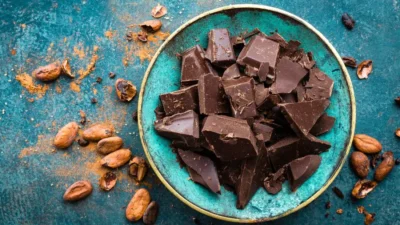6 ways fibre is your gut’s best friend

Dietary fibre is the name for a large group of complex carbohydrates that we cannot digest in our stomach but ‘feed’ and get fermented by the ‘good’ bacteria in our large intestine. Even though we can’t digest it ourselves and rely on the trillions of bacteria living in our gut microbiome to work their magic, fibre is vitally important for our gut and digestive system to function properly, Here are six ways fibre is good for our gut and therefore good for our entire body:
1. Feeds the gut microbiota
When we eat fibre-rich foods, the fibre is not digested in our stomach but passes through to our large intestine where it is fermented, acting as a prebiotic, feeding and promoting the growth of beneficial gut bacteria. If we starve our gut bacteria of fibre – their main energy source –the population of beneficial bacteria falls and those that are left have to find another source of food – the protective mucus lining of our gut. This mucus layer is important in protecting the gut and when it is damaged it can lead to infection and inflammation. The same ‘good’ bacteria that offer so many benefits can cause our digestive system a lot of problems if we deprive them of fibre so make sure you’re feeding them well!
2. Promotes a rich and diverse microbiome
Our diet dramatically shapes the landscape of our gut microbiome and the richness and diversity of our gut microbiota: “the more diverse the diet, the more diverse the microbiome and the more adaptable it will be to perturbations.” Therefore, by eating a wide range of fibre-rich foods we can encourage a diverse and resilient gut microbiome. However, the increased richness of the gut bacteria only lasts as long as the particular fibre-rich food is eaten so it’s important to maintain a varied, fibre-full diet over our lifetime, aiming for around 30 plants a week. Even though our gut bacteria can adapt rapidly to a new diet – within a few days – it’s no good eating kimchi for just a week and expecting any lasting changes to occur.
3. Produces short-chain fatty acids
When our beneficial gut bacteria ferment fibre in our colon, they produce many useful compounds, including the short-chain fatty acids (SCFAs) acetate, propionate and butyrate. The latter is the main energy source for the cells lining your colon, can kill colon cancer cells and plays a part in gluconeogenesis – providing energy to organs by turning non-carbohydrate sources into glucose. SCFAs have also been associated with lower diet-induced obesity and with reduced insulin resistance as well as having anti-inflammatory properties, which can help with conditions such as inflammatory bowel disease (IBD). Low-fibre diets, on the other hand, have the exact opposite effect, reducing the production of SCFAs and producing potentially detrimental metabolites.
4. Keeps you regular
Perhaps fibre’s most famous benefit is its ability to keep our bowel movements regular and help us avoid constipation. A systematic review and meta-analysis found that 77 per cent of patients found relief from constipation when they were given a fibre supplement and “fibre significantly increased stool frequency and softened stool consistency compared with placebo”. However, the researchers noted that flatulence increased with fibre (which will probably not come as a surprise to anyone!). In the UK, most people do not meet the daily recommendations for fibre (30 grams a day for adults) so if you suffer from constipation, increasing fibre may be your first port of call. However, for some people, suddenly increasing fibre can actually make constipation worse – especially if you’re not used to eating it or the constipation is caused by other issues such as irritable bowel syndrome (some types of fibre can help prevent and control diseases such as IBS but others can worsen symptoms). If you are not eating enough fibre, try increasing it in your diet gradually.
5. Strengthens your gut lining
Our colon is covered in a protective mucus layer that acts as a barrier against harmful disease-causing bacteria known as enteric pathogens. If we don’t feed our gut bacteria enough fibre, they resort to using the mucus lining for energy which can result in infections and inflammation (colitis). Therefore, “regular consumption of dietary fibre helps prevent erosion of the intestinal mucus barrier by the gut microbiome, blunting pathogen infection and reducing the incidence of colitis.”
However, fibre consumption doesn’t just support the gut lining by stopping the bacteria from consuming it. The aforementioned butyrate is the main energy source for the cells lining your colon and SCFAs maintain the integrity of the barrier and can help repair any damage done to the mucus lining of the gut.
6. Reduces the risk of many diseases
Fibre, and the byproducts of its fermentation in our colon, have many health benefits including “strong evidence” of decreased risk of cardiovascular disease, type 2 diabetes and some types of cancer. An umbrella review of systematic reviews and meta-analyses found “highly significant” results linking fibre consumption to reduced risks of cardiovascular disease and mortality, coronary artery disease, pancreatic cancer and gastric cancer. In conclusion the researchers recommended “higher fibre intake as part of a healthy diet.”
There is also a well-known link between colorectal cancer and fibre intake, with high-fibre diets being used to prevent cancer development. A 2019 systematic review and meta-analysis also found that a high fibre diet may reduce the risk of diverticular disease, and “individuals consuming 30 grams of fibre per day have a 41 per cent reduction in risk compared to persons with a low fibre intake”.
Despite its huge role in a healthy diet, fibre often gets overlooked and many people do not get enough. The blanket vilification of carbs has certainly not helped fibre’s reputation but it is vitally important for our health in so many ways. If you’re not getting the recommended 30 grams a day, gradually add more fibre to your diet bit by bit – if you add too much too soon you are likely to experience some gas and bloating but if you do it slowly, your digestive system will adapt and you’ll reap all the benefits of a fibre-full life. Start off swapping white and refined carbs such as white bread, white rice and white pasta, for example, for wholemeal bread, brown rice and wholewheat pasta, respectively). To find out more about fibre, including the difference between soluble and insoluble, and the best food sources visit our A-Z of Nutrients.







